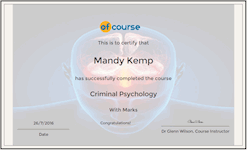Criminal Psychology
OfCourse
Summary
- Certificate of completion - Free
- Tutor is available to students
Overview
Do you have a fascination for the way that criminals think and behave? This criminal psychology course brings you the opportunity to enter the mind of a criminal and understand the thought processes that some of the most famous criminals were experiencing. Dig deeper than what appears on the surface and get to the root causes of all crimes, the Criminal’s psychology.
Course media
Description
- 48 video tutorials, PowerPoint style lectures explaining the psychology of criminals
- A course quiz to test your knowledge of the course
- A progressive learning experience, covering everything from the causes of crime to the rehabilitation process
- Learn the psychology and thought processes of some of the most famous criminals ever
- Learn from a teacher who has given expert witness in a number of high profile cases
- Also covers body language and lie detection!
Course Overview
Take this course and gain an understanding of the thought process and psychology that criminals have and the impact that society has had on this. Learn what are the main causes of crime and the prevention methods that have been implemented as an attempt to decrease these figures, understand the role that prison plays as a deterrent and a rehabilitation process. This course allows you to access the root causes for crimes committed by entering the mind of a criminal.
Instructor Bio
Learn from Dr. Glenn Wilson who has decades of experience in the criminal psychology field and has been an expert witness for a number of high profile cases in the UK, including the acquittal of Colin Stagg for the Wimbledon Common murder in 1992 and the conviction of Rosemary West for the Gloucester killings which occurred in 1995.
Curriculum
Introduction
- Intro
- What is Crime?
Causes of Crime
- Causes of Crime Powerpoint
- Risk Factors
- Crime and Poverty
- Unemployment
- Perceived Unfairness
- Moral Compass
- Conscience Failure
- Absent Fathers
- Too Much TV
- Lead Poisoning
- Criminal Genes
- Psychopathy
- Summary
Prevention of Crime
- Crime Prevention Powerpoint
- Security Devices
- Being Watched
- Zero Tolerance
- Pre-Crime Forecasts
- The Look of a Crook
- Neurocrimonology
- Is Criminality Adaptive?
- ADHD and Crime
- Summary
Punishment and Rehabilitation
- Punishment and Rehabilitation Powerpoint
- What is Prison For?
- Recidivism
- Predicting Reoffense
- "Three Strikes" Law
- Community Service
- Compulsory Crime
- Leopards and Spots
- Summary
Psychological Profiling of Serial Killers
- Profiling Serial Killers Powerpoint
- The Real Crackers
- Jack the Ripper
- FBI Profile
- Typical Serial Killers
- Common Motives
- Suffolk Strangler
- Organised vs Disorganised
- M.O. & Signatures
- Yorkshire Ripper
- Radex Model
- Charismatic & Intelligent
- Are Serial Killers Insane?
- Atypical Killers
- Female Killers
- A Profile is not Evidence
Geographical Profiling
- Geographical Profiling Powerpoint
- Geographical Profiling
- The Railway Rapist
- Marauders vs Commuters
- Geo-profile Jack the Ripper
- Fulcrum Theory
- Disposal Sites
- Psychological Barriers
- Home Comforts
- Range of the Night
- The Mardi Gra
- Summary
Body Language of Lying
- Body Language of Liars Powerpoint
- Lies Big and Small
- Spotting Lies
- Good Liars
- Trustworthy Faces
- Smiles: Fake vs Felt
- Micro Expressions
- Emotional Leakage
- Eye Movements
- Stress Signs
- Lip Pressing
- The Pinnochio Effect
- Thermal Imaging
- Summary
Interviewing and Interrogation
- Interrogation Methods Powerpoint
- Floating Witches
- Polygraph
- Truth Serums
- Voice Stress Analysis
- Speech Patterns
- Linguistics
- Counting Words
- Elements of Truthful Tales
- Interviewing Techniques
- Lies in the Brain
- Pune Poisoning
- Summary
Quiz
- Course Quiz
Course Highlights
- 48 video tutorials, PowerPoint style lectures explaining the psychology of criminals
- A course quiz to test your knowledge of the course
- A progressive learning experience, covering everything from the causes of crime to the rehabilitation process
- Learn the psychology and thought processes of some of the most famous criminals ever
- Learn from a teacher who has given expert witness in a number of high profile cases
- Also covers body language and lie detection!
Why Choose OfCourse Learning?
All courses are taught by verified experts
- Students enjoy 24/7 access to their courses
- Courses can be accessed on any device
- Students get lifetime access to their courses so they can work at their own pace
- On completion, students receive a course certificate from a recognised educational institution
- Become a part of a global learning community where you can talk with teachers and students about the course
Who is this course for?
- Anybody involved in law enforcement
- Clinical psychology students
- Anyone who has an interest in clinical psychology
Requirements
There are no prerequisites for this course
Certificates
Certificate of completion
Digital certificate - Included
Reviews
Currently there are no reviews for this course. Be the first to leave a review.
Legal information
This course is advertised on reed.co.uk by the Course Provider, whose terms and conditions apply. Purchases are made directly from the Course Provider, and as such, content and materials are supplied by the Course Provider directly. Reed is acting as agent and not reseller in relation to this course. Reed's only responsibility is to facilitate your payment for the course. It is your responsibility to review and agree to the Course Provider's terms and conditions and satisfy yourself as to the suitability of the course you intend to purchase. Reed will not have any responsibility for the content of the course and/or associated materials.



